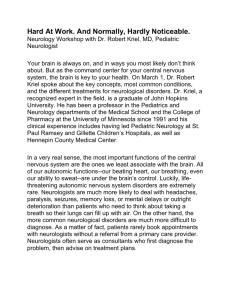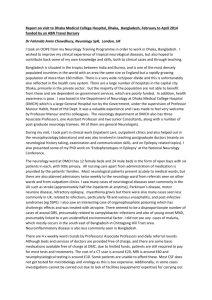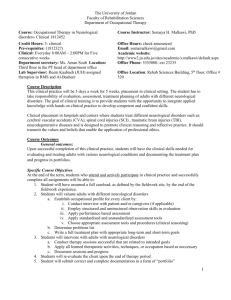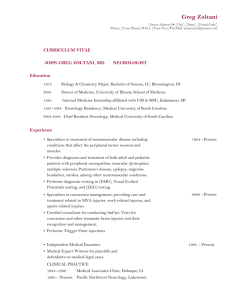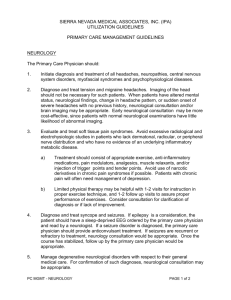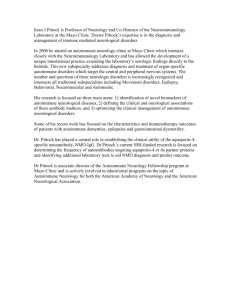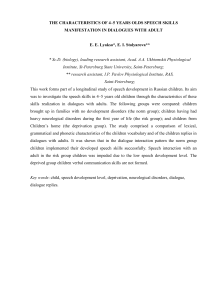Neurological Secondary Care Services South of Tees
advertisement
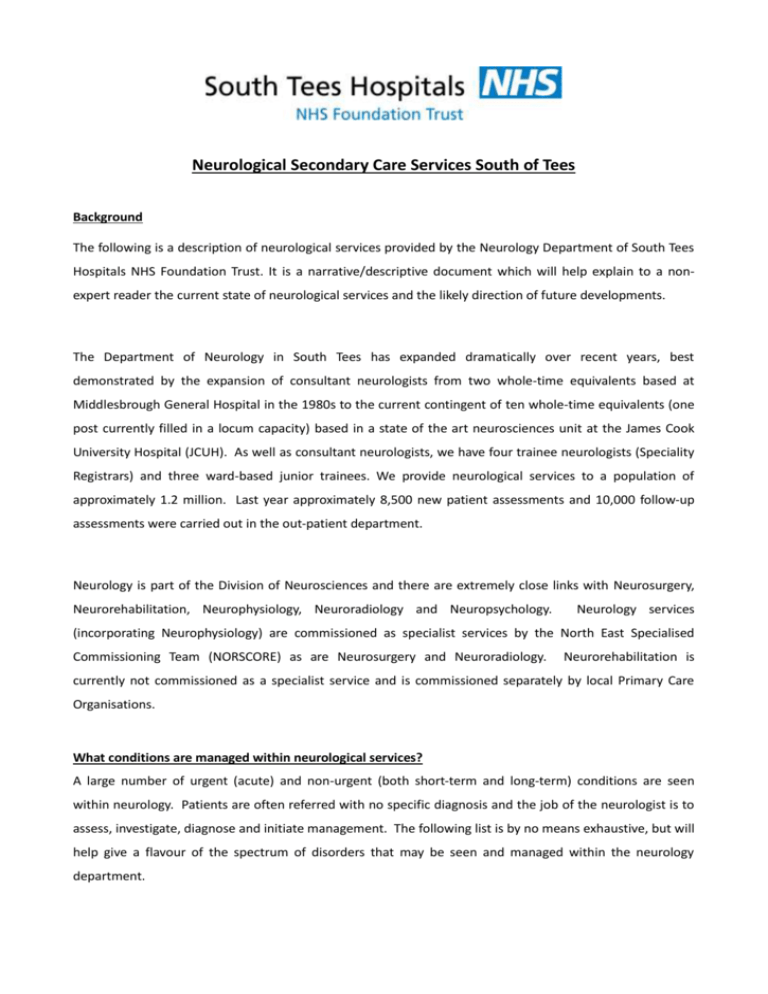
Neurological Secondary Care Services South of Tees Background The following is a description of neurological services provided by the Neurology Department of South Tees Hospitals NHS Foundation Trust. It is a narrative/descriptive document which will help explain to a nonexpert reader the current state of neurological services and the likely direction of future developments. The Department of Neurology in South Tees has expanded dramatically over recent years, best demonstrated by the expansion of consultant neurologists from two whole-time equivalents based at Middlesbrough General Hospital in the 1980s to the current contingent of ten whole-time equivalents (one post currently filled in a locum capacity) based in a state of the art neurosciences unit at the James Cook University Hospital (JCUH). As well as consultant neurologists, we have four trainee neurologists (Speciality Registrars) and three ward-based junior trainees. We provide neurological services to a population of approximately 1.2 million. Last year approximately 8,500 new patient assessments and 10,000 follow-up assessments were carried out in the out-patient department. Neurology is part of the Division of Neurosciences and there are extremely close links with Neurosurgery, Neurorehabilitation, Neurophysiology, Neuroradiology and Neuropsychology. Neurology services (incorporating Neurophysiology) are commissioned as specialist services by the North East Specialised Commissioning Team (NORSCORE) as are Neurosurgery and Neuroradiology. Neurorehabilitation is currently not commissioned as a specialist service and is commissioned separately by local Primary Care Organisations. What conditions are managed within neurological services? A large number of urgent (acute) and non-urgent (both short-term and long-term) conditions are seen within neurology. Patients are often referred with no specific diagnosis and the job of the neurologist is to assess, investigate, diagnose and initiate management. The following list is by no means exhaustive, but will help give a flavour of the spectrum of disorders that may be seen and managed within the neurology department. Acute (“urgent”) disorders Brain and spine infections meningitis, encephalitis, TB, HIV, lyme disease Strokes and brain haemorrhages particularly more unusual or complex presentations Fits and other causes of loss of consciousness Acute headaches severe migraine, cluster headache, trigemminal neuralgia thrombosis of brain veins / spasm of brain arteries tears (dissection) to brain and neck arteries Acute muscle weakness muscle diseases e.g. polymyositis neuromuscular diseases e.g. myasthenia gravis nerve diseases e.g. Guillain Barre Syndrome Brain and spine inflammations flare-ups & first presentations of multiple sclerosis neurosarcoid, neurolupus, autoimmune inflammatory disorders Toxic disorders nutritional deficiencies central nervous system poisons disorders of normal body metabolism Brain and spinal tumours Non-acute, long-term and short-term management Extrapyramidal disorders Parkinson's Disease, Progressive Supranuclear Palsy (PSP) etc. Inflammatory disorders multiple sclerosis etc. Cognitive disorders Alzheimer's Disease, dementia with Lewy bodies, fronto-temporal dementia etc. Motor neurone disease Epilepsy Nerve and muscle diseases peripheral neuropathy, myasthenia gravis, muscular dystrophy Hereditary and acquired ataxias (disorders affecting balance) Chronic (long-term) headache disorders Functional (psychological) disorders / patients with medically unexplained symptoms 2 Degenerative spinal diseases Sleep disorders Dystonia and movement disorders On the whole, patients with neurological disorders will be seen either on the acute medical ward (for those with urgent presentations) or in the out-patient department. Acute Service South of Tees Patients may be admitted through Accident and Emergency (A&E) or the Medical/Acute Assessment Unit (MAU/AAU). Patients presenting initially to other hospitals (North Tees, Hartlepool, Darlington, Bishop Auckland, Friarage Hospital Northallerton) may be referred and subsequently transferred to the on-call neurology team, dependant upon the bed-availability on the neurology ward (there is a single neurology ward at JCUH with 21 beds, 2 of which are specialised for complex assessment of patients with fits). Alternatively, these patients may be managed in the other hospital and seen by a visiting JCUH neurologist as a ward consult, inevitably with some delay. Many patients will initially be managed by the on-call medical team who may involve the on-call neurology team by means of a ward-consult request. Following assessment, patients may be transferred to the care of the neurology team or alternatively will remain under the medical team with advice on further investigation / management. A sizeable number of patients will be managed entirely by the medical team during their admission. Subsequently, these patients may be referred to the neurology out-patient clinic or else may never get to see a neurologist. The model of acute care described above mirrors that widely practised around the UK. Its appropriateness has frequently been questioned, most recently in the document “Local Adult Neurology Services for the next decade”. One of the main criticisms levelled is that neurologists now spend too much time seeing increasing numbers of “worried well” in the out-patient clinic whilst patients with serious acute neurological disorders may not see a neurologist for some days following their presentation or in some cases may never see a neurologist. In general we have a good relationship with our medical colleagues within JCUH. We offer a same-day neurological opinion if requested through the ward-consult service and have developed daily ambulatory 3 emergency clinics to accommodate those patients who have been seen with urgent problems in A&E/MAU/ or by their GPs and who do not require immediate admission. Patients presenting to the surrounding hospitals are however somewhat disadvantaged, relying either on emergency transfer to JCUH (and therefore bed availability) or else a ward consult which will typically be once a week, less if the consultant happens to be on leave. Out-patient Services South of Tees Neurology out-patient clinics are provided daily at JCUH, twice-weekly at Friarage Hospital Northallerton and Hartlepool and weekly in the case of Darlington and Bishop Auckland. There are also regular clinics carried out in Whitby. Clinics will typically involve a consultant neurologist with or without a trainee (Speciality Registrar). There are also clinics carried out by specialist nurses in epilepsy, multiple sclerosis and Parkinson's disease, largely confined to the JCUH. Finally, there is a multidisciplinary motor neurone disease clinic, supported by a consultant neurologist, MND care co-ordinator, various therapists and social worker. Clinics may be “general” (appointing patients with any of the wide variety of conditions classed as neurological), or “specialist” (confined to patients with a particular disorder or group of disorders). The specialist clinics are conducted by a consultant or specialist nurse with particular interest and expertise in that disorder. Consultant delivered specialist clinics at JCUH cover patients with stroke and transient ischaemic attacks (“mini-stroke”), epilepsy and blackouts, Parkinson's disease, motor neurone disease, dementia and cognitive disorders, sleep disorders, autonomic disorders (conditions which the nervous control of blood pressure, sweating, digestion etc.) and disorders requiring botulinum toxin therapy (certain movement disorders). Specialist nurse clinics include Parkinson's disease, epilepsy and multiple sclerosis. Visiting neurologists (from Newcastle) provide specialty clinics for patients with muscle diseases and neurogenetic disorders. It is not possible, without employing a very large number of consultants, to have specialty clinics covering all of the neurological conditions. Nonetheless, there are important areas where we would like to strengthen our consultant specialty interests, notably in the areas of movement disorders and neuroinflammatory conditions (such as multiple sclerosis). To this end, two of the neurologists in the department are developing their expertise in MS and we have identified a movement disorder specialist for a currently vacant post. In the future, it may be possible to increase the specialist nurse provision both to 4 support the current specialty nurses but also to include other conditions such as headache disorders. The specialty clinics are currently confined to JCUH. Patients seen in these clinics, with the exception of stroke and transient ischemic attack (TIA) which is also catered for within surrounding hospitals, are expected to travel to Middlesbrough. We have recently started a nurse led Parkinson's disease clinic at Friarage hospital Northallerton. There are arguments for and against organising specialty clinics away from JCUH (convenience for the patient versus availability of sophisticated resources at JCUH), but this may ultimately be seen as desirable assuming the issue of resources can be resolved. There seems little doubt that patients increasingly wish to be seen by specialists in the condition they have. In recent years this has led to a large number of patients previously seen and managed by general practitioners or general physicians being referred into neurology clinics. Super-specialisation in other medical specialties has led to the demise of the general physician and general practitioners are now rarely exposed to neurology in their training years. The result is that there is an increasing (and understandable) reluctance from non-neurologists to manage patients with neurological symptoms. It is this demand for specialist input from patients and the diminishing neurological skills of general practitioners and physicians that has fuelled the increased provision of neurologists across the UK in the last 20 years. One consequence of this, alluded to above, is that the pattern of referrals to neurology clinics has altered. A significant proportion of out-patient neurology now involves seeing patients with complex symptoms which sound neurological in origin, but which ultimately turn out to have a non-neurological basis. It is, of course, a perfectly appropriate role for a specialist to rule-out or reverse an inappropriate neurological diagnosis. Nonetheless, the case has been made for improving the provision of neurological expertise in primary care, either by involving general practitioners with a specialist interest (GPwSI) or else developing primary-care based specialist nurses. The suggestion is that if the majority of patients who do not have neurological conditions can be appropriately managed within primary care then the remainder will be able to be seen more quickly or more frequently by the specialist. Currently there is considerable pressure on review slots for patients with neurological disorders, with no vacant slots in some clinics in excess of six months. For patients with unstable conditions, when decisions need to be made sometimes at weekly intervals, this poses obvious problems. It has been suggested that new referral to follow-up ratios in neurology out-patient clinics are too high and should be reduced i.e. we should have fewer review slots. Regular specialist review is a requirement of national guidance relating to chronic neurological conditions (including that of NIHCE) and if 5 the skills to do this are unavailable in primary care it seems self-evident that this will need to be provided from secondary care clinics. It Is not clear how this will be achieved whilst reducing the availability of review appointment slots. Strengths We have developed a good skill mix in the neurology department with a group of like-minded neurologists and specialist nurses, dedicated to providing and developing the service. From the patient’s perspective we provide a wide variety of general and specialist neurological services with excellent access to timely supporting investigations. We offer convenience of local general neurology clinics to patients from around the region and I believe our physician colleagues in JCUH and surrounding hospitals value and appreciate the support we provide them. The majority of patients can have their illnesses diagnosed and managed close to home and tertiary referrals to centres in London / Newcastle etc. are now rarely required. Our specialist nurses have significantly improved the accessibility of the department for patients with epilepsy, Parkinson's disease, MS and MND. Some specialties are extremely well supported. The neurologists have made major contributions to the development of acute stroke / TIA management in JCUH. Epilepsy services have been dramatically improved in recent years and we have gone from having no dedicated MND support structures to being a Motor Neurone Disease Association Care Centre. Patients with cognitive disorders, sleep disorder and autonomic conditions can now all receive highly specialised neurological assessment and management locally. Opportunities for development Whilst still meeting national targets, we struggle to see patients newly referred as quickly as we would like. We particularly struggle to offer patients short-term review appointments, with clinics booked up for some months in advance. Patients presenting acutely to surrounding hospitals and to a lesser extent JCUH do not always see a neurologist as quickly as would be desirable (or in some cases at all). Whilst we provide regular clinics to 6 surrounding hospitals, these do not occur during periods of consultant leave and one large neighbour we support (North Tees Hospitals) has no regular neurological presence on its own site. There are some specific areas of neurological practice where we would benefit from greater local expertise, notably the management of patients with movement disorders and multiple sclerosis. Links with primary care are fragile. There is much less direct contact and communication between consultants and GPs than in the past. The days of joint meetings between primary and secondary care seem to have passed and this may in part explain why we do not always understand each other's perspective. Developing a properly integrated neurological service with seamless boundaries between primary and secondary care must be to the advantage of patients, though if anything the direction of travel in recent years has been the opposite. These seamless boundaries should ideally encompass the full range of services necessary to the management of patients with long-term conditions including in-hours and outof-hours general practice, physiotherapy, occupational therapy, speech and language therapy, social services, wheelchair services, palliative care services etc. We have seen growth in specialist nurse roles over recent years and see this as an opportunity for further development as well as seeking opportunities to increase therapeutic psychologist input. The future Briefly, we need to develop services that are better integrated with primary care. This may involve identifying and training GPwSIs or else developing and expanding the role of the specialist nurse practitioner. If these developments do occur I believe it is vital that this is done through primary/secondary care collaboration. We need to strengthen our specialist support particularly for patients with MS and movement disorders. Two of the neurologists our developing their role as MS specialists and we have identified a potential colleague with a specialist movement disorder background for a currently vacant post. We need to identify better ways to deliver neurological services to the patients in their own locality. This is likely to involve investing in specialist nursing support, with or without specialist GPs (if there is the enthusiasm within primary care to develop this role). 7 We need to find better solutions for patients with acute neurological disorders that will result in more timely access to specialist neurological opinions whatever the geographical location of the patient. Dr Gavin Young, Clinical Director – Neurology 14 September 2011 8
